Adaptive Leadership in the Hybrid Era: Insights on Engagement, Cohesion, and Productivity | Global TV
By NV Paulose, Chairman, Global TV +91 98441 82044
The workplace is no longer confined to four walls. The collaboration spans across time zones and devices. Adaptive leadership has emerged as a critical competency. Academicians with industrial exposure build safe bridges for their students to traverse through the storms of the realistic world. Students are immensely benefitted with this emotionally connecting expedition through enormous opportunities to interact with real world of hurry burry.
A compelling session titled “Adaptive Leadership: Thriving in a Hybrid Work Environment” held at School of Social Work, Roshni Nilaya, featuring two dynamic speakers: Ms. Rajathi Subramaniam, Founder of Percepts Advisory Services, Bengaluru, and Ms. Yashodha Raji, HR – Business Partner at Ivanti, Bengaluru. The session was expertly moderated by Dr. Devraj K, Former Director, SDM College of Business Management, Mangaluru.
Together, they unpacked the complexities of leading in hybrid work environments; where physical boundaries blur, engagement takes on new meaning, and leadership demands a blend of empathy, flexibility, and strategy.
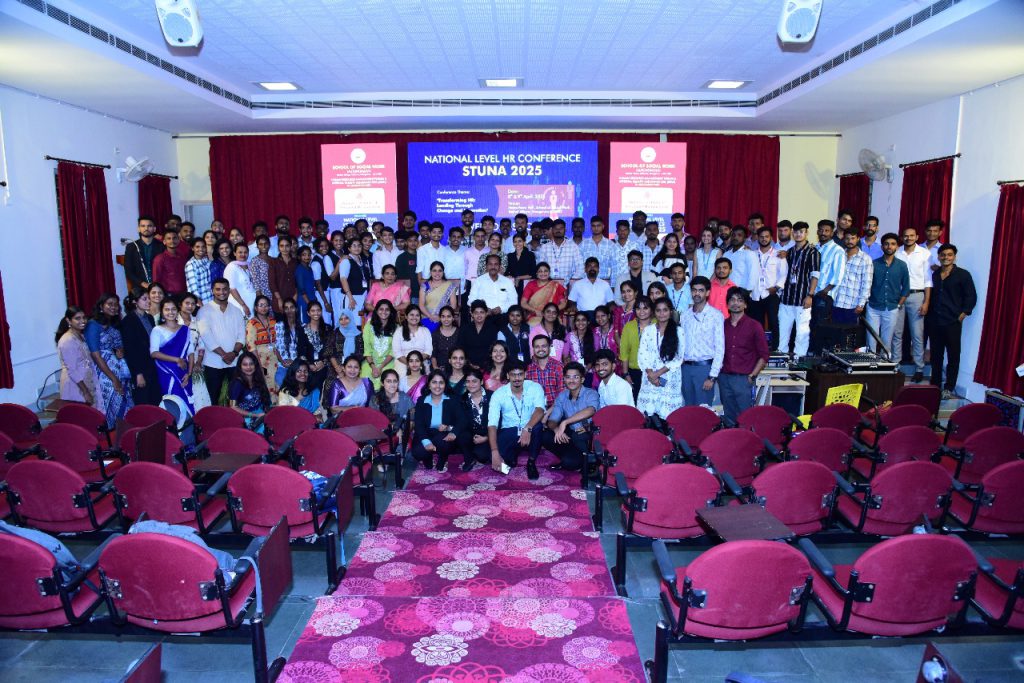
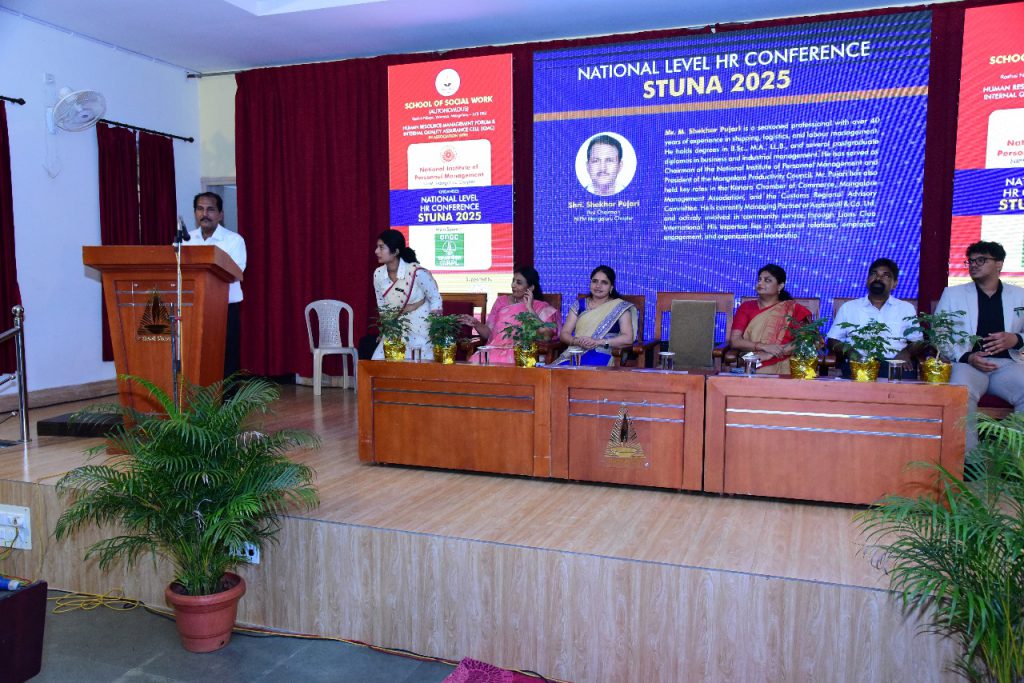
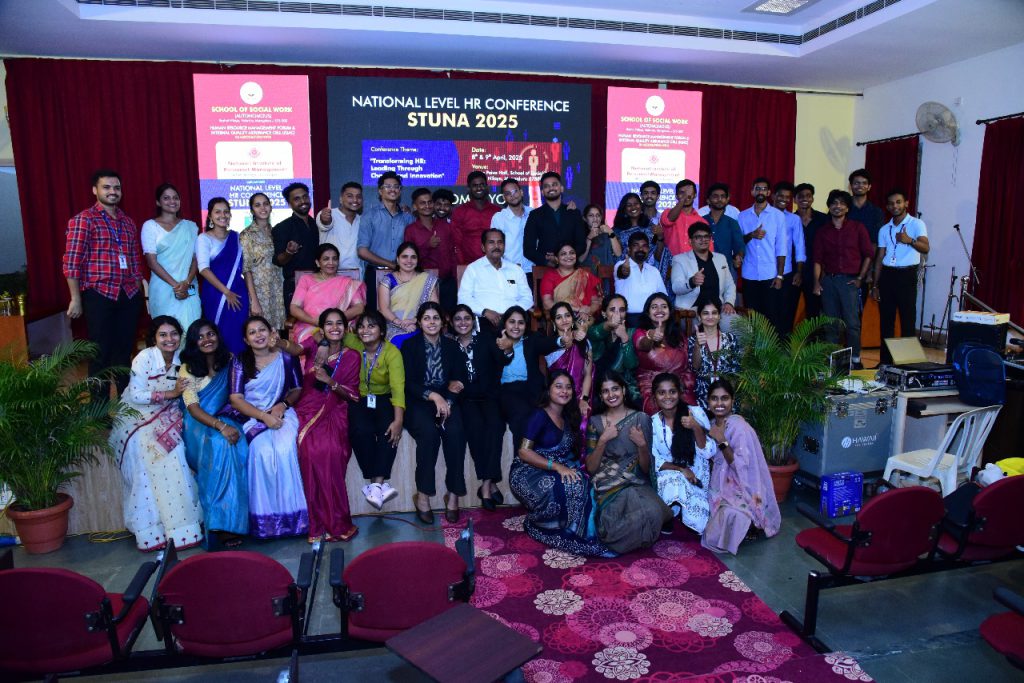
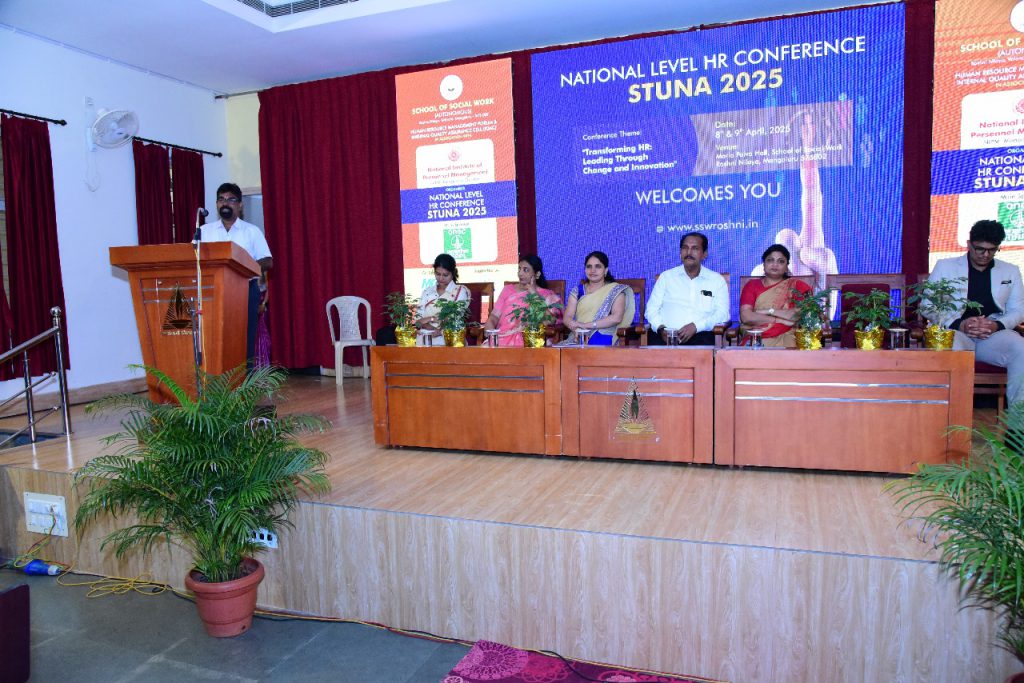
Leadership Styles that Foster Employee Engagement in Remote Settings
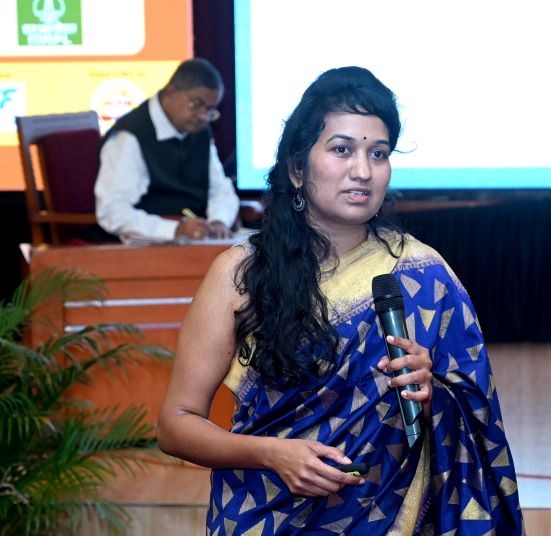
Opening the session, Ms. Rajathi Subramaniam drew attention to the evolving nature of leadership in a post-pandemic world. She underscored that engagement is no longer about presence; it’s about purpose. Drawing from her experience as an HR change consultant, she presented a powerful image of a child trying to move a tree alone in a storm, a metaphor she used to emphasize initiative and intrinsic motivation as cornerstones of leadership in isolation.
Rajathi stressed that in a remote environment, leaders must shift from commanding roles to coaching mindsets. Hierarchies flatten in digital spaces, and influence now flows from authenticity, emotional intelligence, and the ability to connect meaningfully; even across screens. She challenged participants to reflect: Are you leading with visibility or with value?
Her key message was clear: Engagement thrives when leaders focus less on monitoring and more on mentoring. Listening empathetically, checking in with intent (not just agenda), and fostering psychological safety are now non-negotiable practices for leaders.
Ms. Rajathi also challenged the audience to reflect on their leadership style, especially when it comes to communication. She posed a provocative question: do we command, or do we demand? This subtle shift in language carried significant weight. Commanding can carry authority built on respect, clarity, and trust. Demanding, on the other hand, often leans into coercion, pressure, and the weight of hierarchy. Leaders, she said, must be conscious of the emotional undertones in their communication. The most effective leaders don’t just speak to be heard; they listen to understand.
Strategies for Maintaining Team Cohesion and Productivity
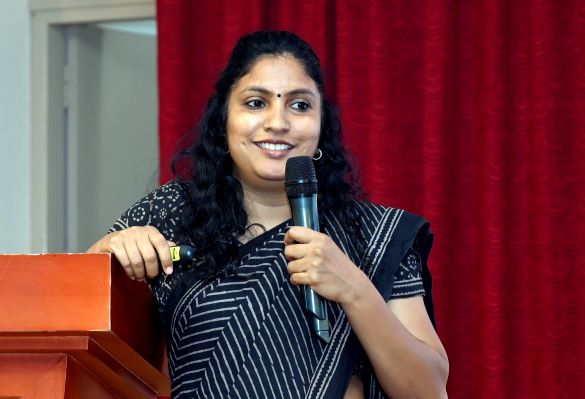
Ms. Yashodha Raji, representing the tech-driven workplace of Ivanti, brought a complementary, execution-focused perspective. Speaking from her role as an HR Business Partner, she emphasized that productivity in hybrid teams depends not just on policies but on people-centric practices.
She introduced practical frameworks that Ivanti uses to drive cohesion, including “culture-building touchpoints” like virtual coffee hours, well-being check-ins, and team retrospectives that prioritize feedback. She noted that “the strongest glue in remote teams is shared purpose reinforced through regular, meaningful interaction.”
Yashodha also pointed out that hybrid teams can fall into the trap of “digital fatigue” or “two-tier cultures”; where in-person employees get more access to leadership than remote ones. To counter this, she suggested deliberate inclusion efforts: rotating facilitation roles in meetings, visibility dashboards, and hybrid-friendly policies that level the playing field for contribution and recognition.
She emphasized the importance of trust over surveillance. “When employees feel trusted and supported, productivity follows,” she said, underscoring that autonomy, paired with clarity, is key in driving performance remotely.
Bridging Perspectives: The Role of the Moderator
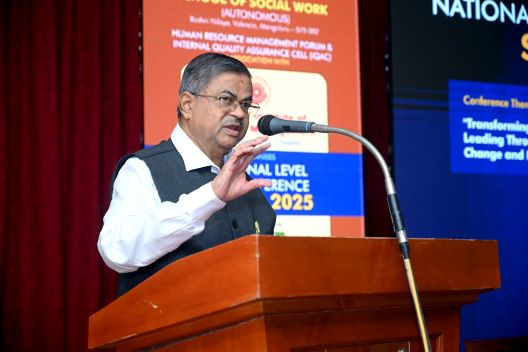
Dr. Devraj K, with his extensive academic and leadership background, skillfully wove together the diverse threads presented by the speakers. He encouraged reflection on how traditional leadership paradigms must evolve, particularly in institutions and sectors that are just beginning to move with the hybrid shift.
He brought attention to intergenerational expectations within teams, noting that younger employees often value flexibility and purpose over rigid structures, while senior staff may seek more direct engagement and clear frameworks. Adaptive leadership, he explained, lies in reconciling these differences without compromising on values or outcomes.
Dr. Devraj also prompted the speakers to share stories of failure and resilience, enriching the discussion with real-world challenges; miscommunications in digital teams, burnout from over-connection, and the struggle to maintain culture when employees have never met in person.
Key Takeaways: A New Paradigm of Leadership
The session ended with a synthesis of actionable insights for leaders navigating the hybrid frontier:
- Engage with Empathy: Leadership in hybrid environments requires deep emotional intelligence; more listening, less micromanaging.
- Communicate with Purpose: Tailor communication to stakeholder roles, avoid generic messaging, and prioritize intentional interactions.
- Build Structures for Feedback: Continuous, contextual feedback loops should replace outdated annual reviews.
- Promote Autonomy with Clarity: Trust employees to manage their work, but set clear expectations and shared goals.
- Create Culture, Not Just Policy: Use rituals, stories, and virtual symbols to maintain cohesion across remote teams.
- Stay Adaptable: Flexibility is the new superpower; adaptive leaders are learners, not just decision-makers.
Leadership in a hybrid world is not less human; it must be more human. The digital workplace may be shaped by technology, but its success depends on the human touch.
From Rajathi Subramaniam’s emotional intelligence-driven leadership approach to Yashodha Raji’s hands-on strategies for cohesion, and with the reflective moderation by Dr. Devraj K, the event provided a powerful lens into the future of leadership; one where adaptability, empathy, and intentional design are the pillars of success.
As organizations continue to grapple with hybrid dynamics, these insights offer a roadmap for thriving in it.
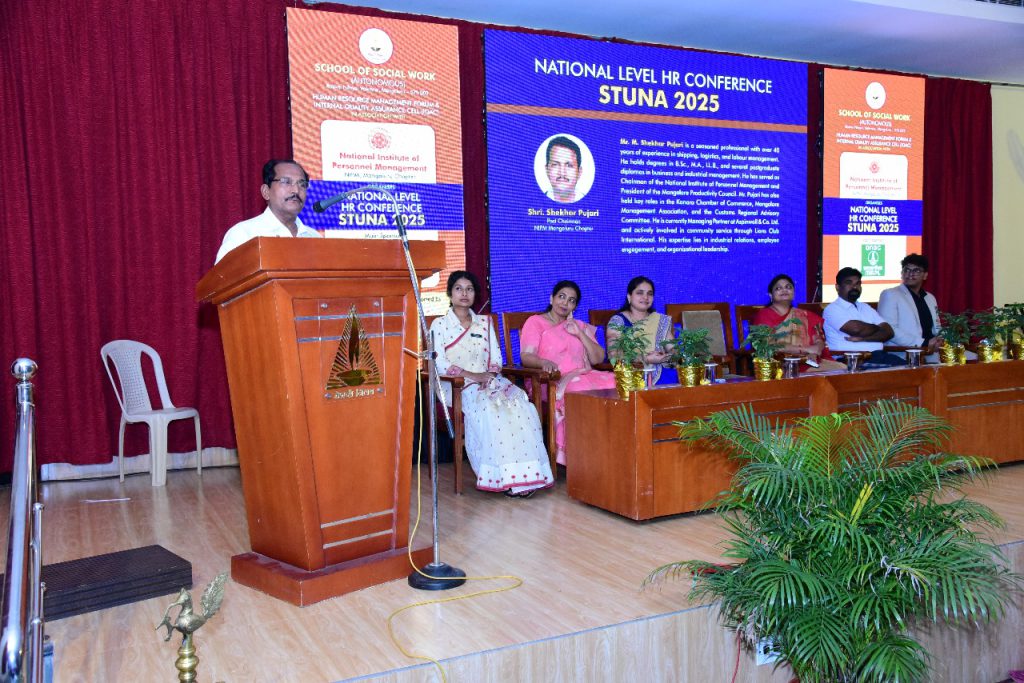
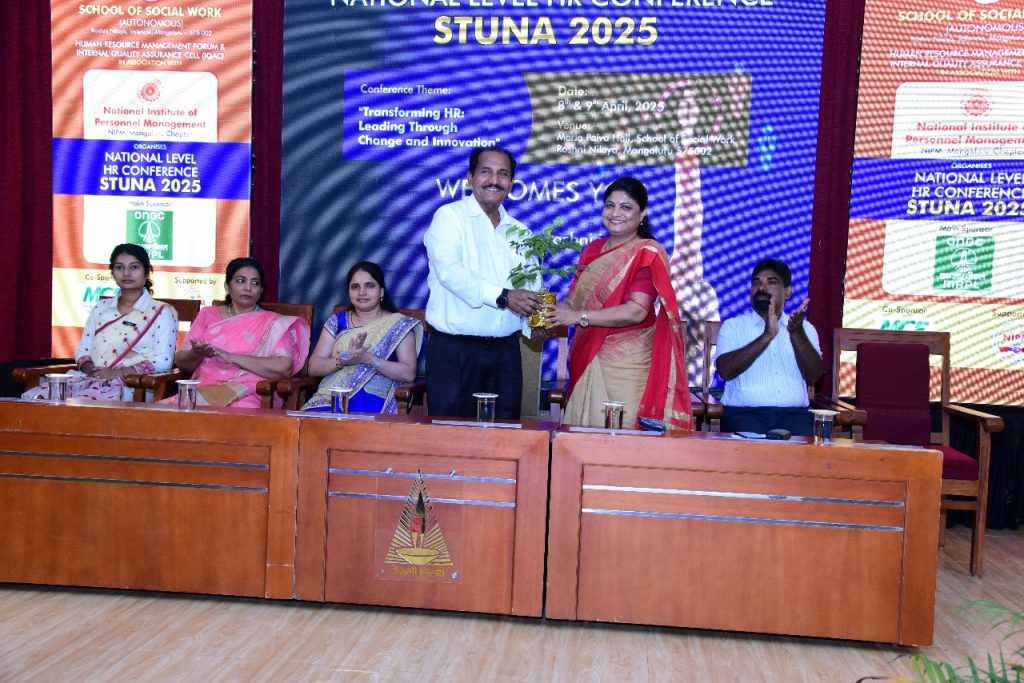
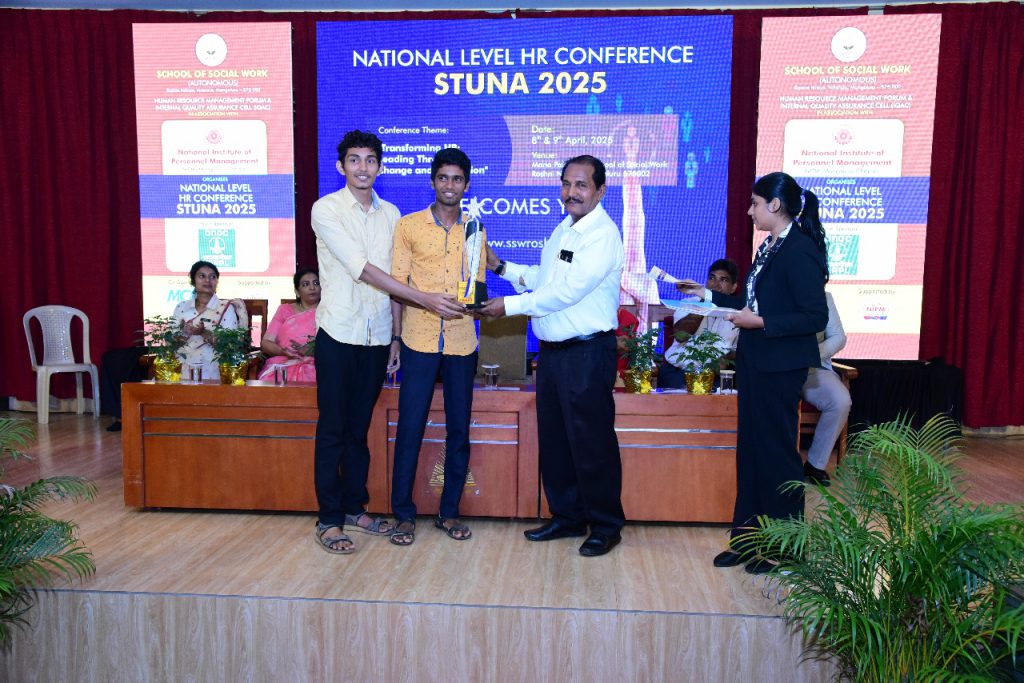
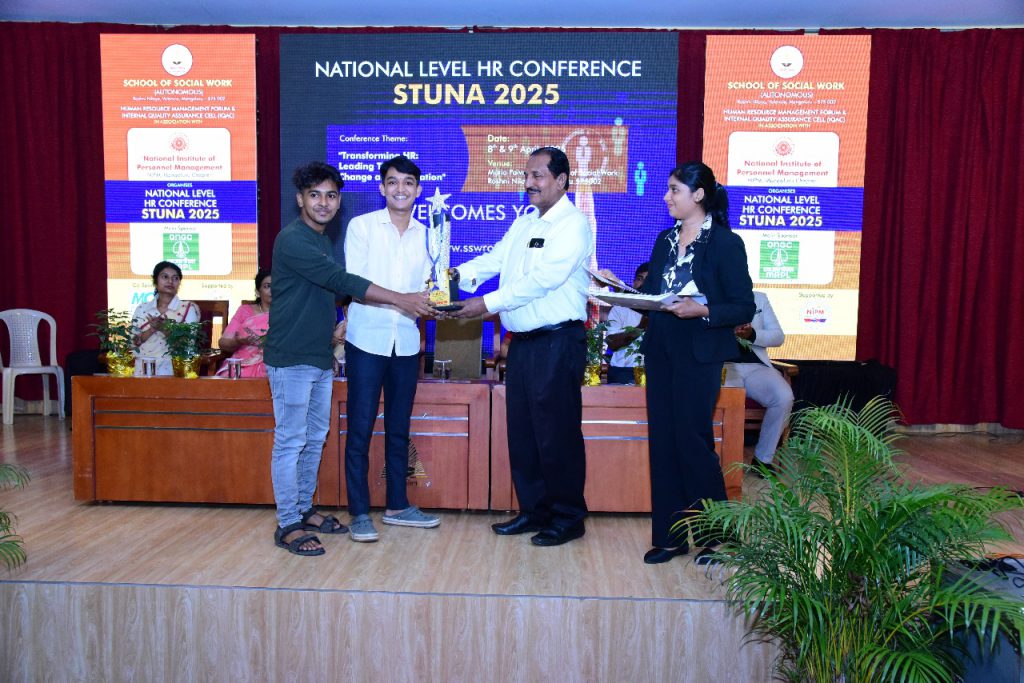
Dr. Sebastin K V, the visionary Co-ordinator of the HRM Forum,
Dr. Sebastin has consistently championed a practical, forward-thinking approach to HR education. His core belief is that students must move beyond classroom theories and immerse themselves in the evolving dynamics of the corporate world. To this end, he envisions the HRM Forum as a vibrant bridge between academia and industry. This is a platform that offers students direct exposure to real-world challenges, innovations, and leadership practices.
By inviting accomplished HR leaders with futuristic mindsets to the campus, Dr. Sebastin creates a living classroom where knowledge meets experience, and insights turn into inspiration. Under his leadership, the Forum has become a crucible of learning, where students engage with thought leaders who are not only experts in HR strategies but also pioneers in adapting to changing workforce landscapes, including hybrid work, AI integration, and people-first cultures.
Dr. Sebastin believes that the future belongs to those who learn by doing, reflecting, and interacting. His mission is to ensure that every session hosted by the Forum contributes to the holistic development of students as industry-ready professionals. They should become confident, competent, and connected to the pulse of contemporary HR leadership.





